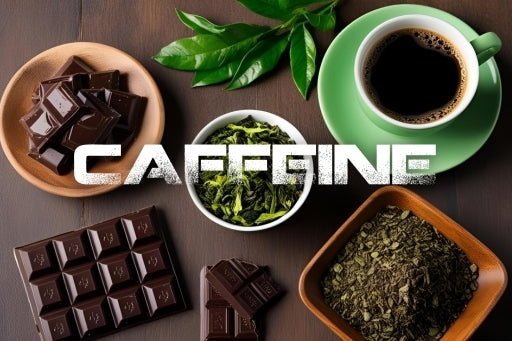
Caffeine for Your Workout: Does It Help?
You know that jolt you get from your morning coffee—the one that makes you feel invincible (well, almost) and ready to conquer your day? That same energy boost could be the secret weapon your workouts are missing.
Caffeine has long been a go-to for athletes, gym rats, and weekend warriors looking to push harder, lift heavier, and go the extra mile. And science backs it up: caffeine enhances endurance, sharpens focus, and even helps your body tap into fat for fuel.
But before you start chugging energy drinks or downing espresso shots pre-workout, let’s break down exactly how caffeine impacts exercise performance.
Plus, learn why the 30–40 mg of caffeine in our Mocha Cream Keto Brick could be the perfect fuel to power your next sweat session.
First Things First, What Is Caffeine?
Caffeine is nature’s energy booster. It’s a natural stimulant found in coffee beans, tea leaves, cacao, and some other plants like guarana. When you consume caffeine, it quickly absorbs into your bloodstream and heads straight for your brain, where it blocks adenosine—the neurotransmitter responsible for making you feel tired.[*] The result? Increased alertness, better focus, and a noticeable energy surge.
How Caffeine Boosts Your Workout
Caffeine isn’t just a morning pick-me-up—it’s a scientifically backed performance enhancer. It works on a cellular level, impacting everything from your muscles and fat cells to your central nervous system, giving you a full-body energy upgrade.[*]
So, how exactly can it support your workout? Let’s take a look:
Increases Energy and Focus
Caffeine stimulates your central nervous system, blocking the neurotransmitter that makes you feel tired and giving you that “let’s do this” mindset before hitting the gym. More focus means better mind-muscle connection and more efficient workouts.
Enhances Endurance
Caffeine is a staple supplement for many athletes, thanks to its proven impact on supporting endurance training. In fact, its effects are so powerful that organizations like the National Collegiate Athletic Association (NCAA) have placed restrictions on high doses.[*]
Research backs up its performance-boosting benefits, too. A large review found that moderate doses of 1.4 to 2.7 mg per pound of body weight can significantly enhance endurance.[*] That last mile may not feel as brutal with caffeine on your side.
Boosts Fat Burning
Caffeine encourages your body to use fat as fuel, aligning perfectly with the keto lifestyle. One review of studies showed that consuming 1.4 to 2.7 mg of caffeine per pound of body weight significantly boosted fat burning during exercise, especially among those with lower fitness levels.[*]
Improves Strength Output
Want to lift heavier? Caffeine could be the ticket. In one study, 12 participants completed bench presses after consuming either 1.4 mg of caffeine per pound of body weight or a placebo. Those who consumed caffeine showed a significant increase in force and power output compared to the placebo group.[*]
When to Consume Caffeine Before a Workout
Timing is everything when it comes to caffeine and exercise. You don’t want to chug a cup of coffee right before your first rep—caffeine takes time to kick in. Research shows that caffeine reaches peak levels in your bloodstream about 30 to 120 minutes after consumption, making this the ideal window to fuel up before training.[*]
Keep in mind that caffeine stays in your system for four to six hours, so if you’re training in the evening, be mindful of your intake to avoid disrupting your sleep.
How Much Caffeine Should You Consume?
Research suggests that 1.4 to 2.7 mg per pound of body weight is the sweet spot for boosting endurance, strength, and focus without unwanted side effects.[*] For example, a 150-pound person might benefit from 200 to 400 mg of caffeine about 30 to 60 minutes before exercise.[*] That’s roughly the amount in two to four cups of coffee.
This falls within the Food and Drug Administration’s (FDA) guidelines, which state that up to 400 mg of caffeine daily is considered safe for healthy adults.[*]
Very high doses of 4.1 mg (or more) of caffeine per pound of body weight are linked to unpleasant side effects like jitters, anxiety, and a racing heart, and don’t provide any additional performance benefits.[*]
What’s more, you don’t always need a big dose to see results. Many people experience noticeable benefits with much smaller amounts, all while avoiding the jitters, crashes, and restless energy that come with higher doses. It’s about finding the sweet spot for you—enough caffeine to sharpen focus, boost endurance, and support performance without overstimulating your system. For some, that could mean as little as 30 to 40 mg, like the gentle lift you’ll find in the Mocha Cream Keto Brick.
The Best Caffeine Sources
Not all caffeine sources are created equal. While they all deliver that energy boost, some come with unwanted ingredients like added sugar or artificial additives. If you’re looking for the best way to fuel your workouts, here are the top caffeine sources to consider:
☕ Coffee
The OG caffeine source, coffee is packed with antioxidants and delivers anywhere from 80 to 200 mg of caffeine per cup, depending on the brew. Black coffee is a great pre-workout choice, but be cautious with high-sugar add-ins like syrups and creamers that can spike blood sugar.
🍵 Green Tea & Matcha
For a smoother energy boost, green tea provides about 29 mg of caffeine per cup, while matcha provides 38-176 mg per cup. These antioxidant-rich options also contain L-theanine, an amino acid that has been shown to act on the hippocampus in the brain and produce stress-reducing effects.[*] The result? Sustained energy without the jitters.
🫖 Black Tea
A step up from green tea in caffeine content, black tea contains about 48 mg of caffeine per cup, making it a solid middle ground between coffee and lower-caffeine options.[*]
🧉 Yerba Mate
This South American tea packs a natural caffeine punch (about 80 mg per cup)—similar to coffee but with a smoother, longer-lasting energy boost. Yerba mate also contains theobromine, which may enhance focus and endurance without the jittery side effects of stronger stimulants.
🏋️ Pre-Workout Supplements
Most commercial pre-workout supplements contain 150-300 mg of caffeine per serving, along with other performance-enhancing ingredients like beta-alanine and nitric oxide boosters. While effective, be aware that some formulas include artificial sweeteners, fillers, and unnecessary stimulants that may cause crashes or stomach issues.
🍫 Dark Chocolate & Cacao
Dark chocolate naturally contains small amounts of caffeine (about 23 mg for dark chocolate containing 70-85% cacao). This makes dark chocolate or cacao-based snacks a solid low-dose caffeine option.
🧱 Mocha Cream Keto Brick
For a balanced pre-workout boost, the Mocha Cream Keto Brick delivers 30 to 40 mg of caffeine—just enough to enhance focus, endurance, and fat burning without overloading your system.
Plus, each Brick delivers 90 grams of fat from raw, organic cacao butter (nature’s top source of fat-burning stearic acid), 30 grams of protein from a plant-based complete protein blend, and 1,000 calories. It’s the perfect combo for sustained energy, muscle support, and satiety.
Caffeine or Not, There’s a Keto Brick for You 💪🏽
Mocha Cream is currently the only Keto Brick flavor with caffeine. Prefer to skip the caffeine? No problem. Keto Brick offers a variety of other flavors—some made with plant-based protein and others with grass-fed whey protein—so you can find the perfect fit for your lifestyle and goals.
With an ideal keto macro breakdown of 81.5% fat, 12.5% protein, and 6% carbs, Keto Bricks have been scientifically proven to elevate ketone levels and kickstart fat burning while you strive for muscle gains.[*]
🔥No matter your fitness goals and lifestyle, Keto Brick has the perfect option to fuel your journey and keep you performing at your very best.
Leave a comment
Comments will be approved before showing up.
